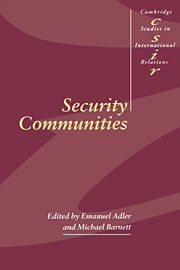Book contents
- Frontmatter
- Contents
- Notes on contributors
- Acknowledgements
- Part I Introduction and theoretical overview
- 1 Security communities in theoretical perspective
- 2 A framework for the study of security communities
- Part II Studies in security communities
- Part III Conclusions
- Index
- CAMBRIDGE STUDIES IN INTERNATIONAL RELATIONS
1 - Security communities in theoretical perspective
Published online by Cambridge University Press: 30 October 2009
- Frontmatter
- Contents
- Notes on contributors
- Acknowledgements
- Part I Introduction and theoretical overview
- 1 Security communities in theoretical perspective
- 2 A framework for the study of security communities
- Part II Studies in security communities
- Part III Conclusions
- Index
- CAMBRIDGE STUDIES IN INTERNATIONAL RELATIONS
Summary
Scholars of international relations are generally uncomfortable evoking the language of community to understand international politics. The idea that actors can share values, norms, and symbols that provide a social identity, and engage in various interactions in myriad spheres that reflect long-term interest, diffuse reciprocity, and trust, strikes fear and incredulity in their hearts. This discomfort and disbelief is particularly pronounced when they are asked to consider how international community might imprint international security. Although states might engage in the occasional act of security cooperation, anarchy ultimately and decisively causes them to seek advantage over their neighbors, and to act in a self-interested and selfhelp manner. The relevant political community, according to most scholars, is bounded by the territorial state, and there is little possibilityof community outside of it.
This volume thinks the unthinkable: that community exists at the international level, that security politics is profoundly shaped by it, and that those states dwelling within an international community might develop a pacific disposition. In staking out this position we summon a concept made prominent by Karl Deutsch nearly forty years ago: “security communities.” Deutsch observed a pluralistic security community whenever states become integrated to the point that they have a sense of community, which, in turn, creates the assurance that they will settle their differences short of war. In short, Deutsch claimed that those states that dwell in a security community had created not simply a stable order but, in fact, a stable peace.
- Type
- Chapter
- Information
- Security Communities , pp. 3 - 28Publisher: Cambridge University PressPrint publication year: 1998
- 56
- Cited by

